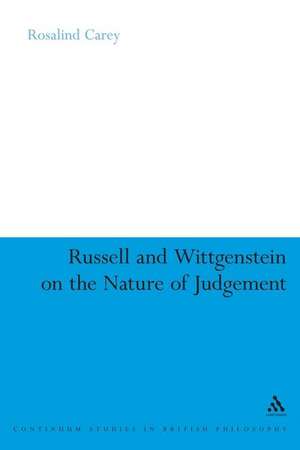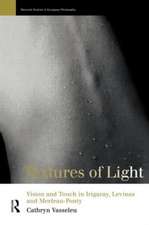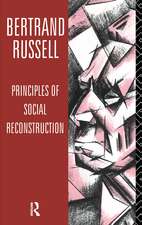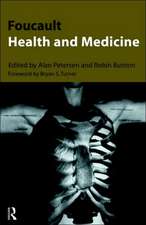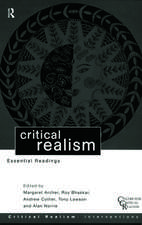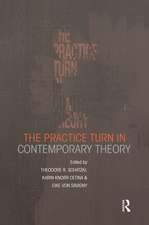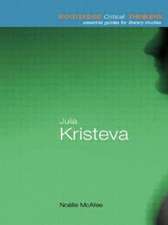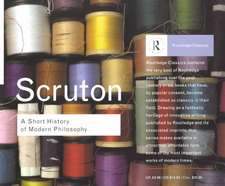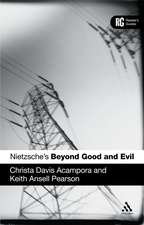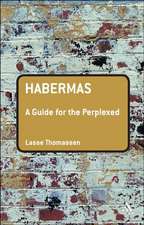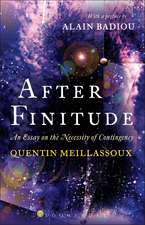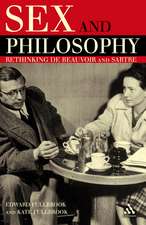Russell and Wittgenstein on the Nature of Judgement: Continuum Studies in British Philosophy
Autor Rosalind Careyen Limba Engleză Hardback – 23 mai 2007
Din seria Continuum Studies in British Philosophy
- 14%
 Preț: 509.45 lei
Preț: 509.45 lei - 22%
 Preț: 257.21 lei
Preț: 257.21 lei -
 Preț: 256.49 lei
Preț: 256.49 lei -
 Preț: 254.84 lei
Preț: 254.84 lei -
 Preț: 255.58 lei
Preț: 255.58 lei - 14%
 Preț: 946.72 lei
Preț: 946.72 lei - 22%
 Preț: 256.85 lei
Preț: 256.85 lei - 23%
 Preț: 255.19 lei
Preț: 255.19 lei - 22%
 Preț: 1005.18 lei
Preț: 1005.18 lei - 14%
 Preț: 1004.60 lei
Preț: 1004.60 lei - 22%
 Preț: 946.31 lei
Preț: 946.31 lei -
 Preț: 255.29 lei
Preț: 255.29 lei - 22%
 Preț: 1154.31 lei
Preț: 1154.31 lei - 13%
 Preț: 257.97 lei
Preț: 257.97 lei -
 Preț: 254.93 lei
Preț: 254.93 lei - 22%
 Preț: 888.97 lei
Preț: 888.97 lei -
 Preț: 256.49 lei
Preț: 256.49 lei - 22%
 Preț: 1005.82 lei
Preț: 1005.82 lei -
 Preț: 256.59 lei
Preț: 256.59 lei -
 Preț: 255.66 lei
Preț: 255.66 lei - 22%
 Preț: 1005.89 lei
Preț: 1005.89 lei - 22%
 Preț: 1005.82 lei
Preț: 1005.82 lei - 31%
 Preț: 1005.49 lei
Preț: 1005.49 lei - 22%
 Preț: 1005.07 lei
Preț: 1005.07 lei - 22%
 Preț: 1007.36 lei
Preț: 1007.36 lei - 22%
 Preț: 1005.18 lei
Preț: 1005.18 lei - 23%
 Preț: 255.76 lei
Preț: 255.76 lei -
 Preț: 256.49 lei
Preț: 256.49 lei - 14%
 Preț: 1006.14 lei
Preț: 1006.14 lei - 22%
 Preț: 1005.98 lei
Preț: 1005.98 lei - 22%
 Preț: 1063.28 lei
Preț: 1063.28 lei - 22%
 Preț: 1154.97 lei
Preț: 1154.97 lei - 22%
 Preț: 1005.98 lei
Preț: 1005.98 lei - 22%
 Preț: 947.78 lei
Preț: 947.78 lei - 22%
 Preț: 1065.17 lei
Preț: 1065.17 lei - 22%
 Preț: 888.58 lei
Preț: 888.58 lei
Preț: 888.01 lei
Preț vechi: 1139.60 lei
-22% Nou
Puncte Express: 1332
Preț estimativ în valută:
169.96€ • 176.77$ • 142.43£
169.96€ • 176.77$ • 142.43£
Carte tipărită la comandă
Livrare economică 14-28 martie
Preluare comenzi: 021 569.72.76
Specificații
ISBN-13: 9780826488114
ISBN-10: 0826488110
Pagini: 160
Dimensiuni: 156 x 234 x 18 mm
Greutate: 0.37 kg
Editura: Bloomsbury Publishing
Colecția Continuum
Seria Continuum Studies in British Philosophy
Locul publicării:London, United Kingdom
ISBN-10: 0826488110
Pagini: 160
Dimensiuni: 156 x 234 x 18 mm
Greutate: 0.37 kg
Editura: Bloomsbury Publishing
Colecția Continuum
Seria Continuum Studies in British Philosophy
Locul publicării:London, United Kingdom
Caracteristici
Wittgenstein is a widely studied topic and this book will be of interest to philosophy students and academics.
Cuprins
Introduction: The Dialogue With Wittgenstein and Its Background. 1: Wittgenstein's January Letter, Relations and Logical Data. 2: Understanding, Belief, and The Problem Of Falsehood. 3: Negative Facts, Bipolarity, and The June Letter. Appendices: Correspondence and Notes. Bibliography. Index.
Recenzii
"Rosalind Carey's new book, Russell and Wittgenstein on the Nature of Judgement, offers a fresh look at Wittgenstein's fateful but notoriously obscure criticisms of Russell's so-called 'multiple-relation theory of judgement', offered in May-June of 1913 as Russell was hastily composing the Theory of Knowledge manuscript...Carey's book is well researched, well written, and makes a thorough and powerful case for its central thesis. Without a doubt, it constitutes an important contribution to both the scholarship addressing this key event within the history of analytics philosophy in particular, and that concerning Russell's work more generally...Carey develops a formidable case for her reconstruction, which is backed up by painstaking research and insightful analysis. Most importantly, Carey offers what seems to me to be a both novel and illuminating perspective on these events, one which promises to enliven scholarly debate on the matter for years to come." -James Connelly, Russell: the Journal of Bertrand Russell Studies, Winter 2008-09
"Carey's suggestions about the origin of the idea that propositions are incomplete symbols...certainly go some way towards completing the picture that Russell scholarship has so far painted of the relation between the multiple-relation theory and Russell's other appeals to incomplete symbols...The claim that propositions are incomplete symbols is obviously a more complex claim and seems at times metaphorical. Carey's attempt to take the claim seriously and to provide some literal interpretation of the metaphor is therefore a welcome contribution...Carey's book provides a useful summary of the dispute between Russell and Wittgenstein that will make it an invaluable resource for those engaging in the study of that dispute." British Journal for the History of Philosophy, 2009
"Do you remember that . . . I wrote a lot of stuff about the theory of knowledge which Wittgenstein criticised with the greatest severity? His criticism . . . was an event of first-rate importance in my life, and affected everything I have done since. I saw that he was right, and I saw that I could not hope ever again to do fundamental work in philosophy. My impulse was shattered, like a wave dashed to pieces against a breakwater. I became filled with utter despair, and tried to turn to you for consolation." Bertrand Russell, 1916, in a letter to Ottoline Morel.
"I recommend the book to anyone interested in the development of Russell's thoughts between 1910 and 1918, and in Russell's relation with Wittgenstein"
"Carey's suggestions about the origin of the idea that propositions are incomplete symbols...certainly go some way towards completing the picture that Russell scholarship has so far painted of the relation between the multiple-relation theory and Russell's other appeals to incomplete symbols...The claim that propositions are incomplete symbols is obviously a more complex claim and seems at times metaphorical. Carey's attempt to take the claim seriously and to provide some literal interpretation of the metaphor is therefore a welcome contribution...Carey's book provides a useful summary of the dispute between Russell and Wittgenstein that will make it an invaluable resource for those engaging in the study of that dispute." British Journal for the History of Philosophy, 2009
"Do you remember that . . . I wrote a lot of stuff about the theory of knowledge which Wittgenstein criticised with the greatest severity? His criticism . . . was an event of first-rate importance in my life, and affected everything I have done since. I saw that he was right, and I saw that I could not hope ever again to do fundamental work in philosophy. My impulse was shattered, like a wave dashed to pieces against a breakwater. I became filled with utter despair, and tried to turn to you for consolation." Bertrand Russell, 1916, in a letter to Ottoline Morel.
"I recommend the book to anyone interested in the development of Russell's thoughts between 1910 and 1918, and in Russell's relation with Wittgenstein"
